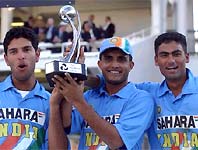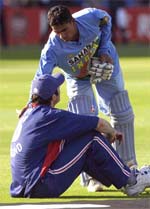Playing hardball with the rules
Prem Panicker
Yes, it has been a while since I wrote a cricket article -- as many participants in a recent online chat pointed out.
In fact, it has been four months -- during which time, I have been in New York City, on assignment with India Abroad. (Rather to my amazement/amusement, subsequent to the last chat, I had a few people call me here, asking how come I was with India Abroad; had I left Rediff, or been sacked. Um no -- the simple fact is that a year ago, Rediff.com bought India Abroad, and the paper is now part of the Rediff stable).
I continue to be based -- for now -- in NYC. This column marks a return, of sorts, to the cricket site -- though I will not, for the duration of my stay here, be doing match reports; I will, hereon, in be writing regular columns, as I used to earlier.
Hopefully, that clarifies things somewhat.
 I was asked, during chat and in e-mail, how come I had not written anything on India's record-breaking win in the final of the NatWest series. Call it a quirk of fate -- that Saturday, I was up at 5 am, to go with a friend to a house where I could watch the game on television.
I was asked, during chat and in e-mail, how come I had not written anything on India's record-breaking win in the final of the NatWest series. Call it a quirk of fate -- that Saturday, I was up at 5 am, to go with a friend to a house where I could watch the game on television.
Od-ing on coffee, I watched the England innings in its entirety, and 26 overs of the Indian innings. And then had to return to office, to cope with a rather serious problem. Mercifully, a cricket fan in this part of the world has a video recording of the entire game, and has promised to send me a copy within the next couple of days -- so more on the game after I watch the part of it that I missed.
I was intrigued, though, by the aftermath -- in particular, England seam bowler Darren Gough’s comment that Indians "played hardball with the rules". [http://sport.guardian.co.uk/cricket/story/0,10069,756036,00.html]
Why am I not surprised? Somehow, bad sportsmanship, bordering on churlishness, is pretty much what we've come to expect from this England side -- whether it is Nasser Hussain's tantrums, or Ronnie Irani's, how do I put it, chronic inability to stay out of the path of batsmen attempting runs, or Ashley Giles's pretense that bowling two feet outside of leg stump is legitimate tactics, or Gough's little number after being squarely beaten.
You would have thought that any side that plays in a game of this kind would feel the pride of participation. And if it found itself on the losing end of a record-breaking game, would have the courtesy, and sportsmanship, to acknowledge the supreme effort of the victors. For instance, Australia plays its cricket hard -- but when they are beaten fair and square, they have the grace to congratulate and complement the victors.
Not crib.
 And what is the crib about? Apparently batsmen are out of turn when they complain that they can no longer see the white ball. "The batsmen complain they can't see it once it gets some grass stains on it, but that's rubbish." That is a direct quote from the seam bowler's signed article.
And what is the crib about? Apparently batsmen are out of turn when they complain that they can no longer see the white ball. "The batsmen complain they can't see it once it gets some grass stains on it, but that's rubbish." That is a direct quote from the seam bowler's signed article.
Doh!
Here is another direct quote: "In the event of a ball during play being lost or, in the opinion of the umpires, being unfit for play through normal use, the umpires shall allow it to be replaced by one that in their opinion has had a similar amount of wear.
"In the event of a ball becoming wet and soggy as a result of play continuing in inclement weather or it being affected by dew, or a white ball becoming significantly discolored and in the opinion of the umpires being unfit for play, the ball may be replaced for a ball that has had a similar amount of wear, even though it has not gone out of shape.
"If the ball is to be replaced, the umpire shall inform the batsmen. Either bowler or batsman may raise the matter with the umpires and the umpires' decision as to a replacement or otherwise will be final."
That is taken, verbatim, from the ICC's book of rules pertaining to play in one-day internationals (Rule number 9: The ball).
How's that again? Either bowler or batsman can bring to the attention of the umpires the perception that the ball is not fit to play. The ball becoming significantly discolored and therefore difficult to sight is one of the reasons why a batting side can ask for a change of ball (just as the bowling side can at any point ask for a change if the bowler thinks it has gone out of shape).
And in all cases, the umpire's decision is final.
Meaning what? Meaning, in this instance, that the Indian batsmen merely told the umpires that they felt the ball had been discolored and was difficult to see. The decision to change the ball was entirely that of the two umpires on the field -- Steve Bucknor and home umpire David Shepherd.
So, how precisely did the Indians play "hardball with the rules"?
Funnily enough, Gough's signed article is in actual fact a criticism of an umpiring decision -- and as such actionable as per the ICC's own rules. Not that I expect any action to be taken, or the ICC to even notice -- just figured I'd be helpful and point it out, in passing.
It is rather sad that a player with Gough's years and experience had only this comment to make about a game in which two young kids, both in their early twenties, produced a textbook on the art of hunting down the seemingly impossible target.
That Gough had no comment to make on that, but chose instead, through word and phrasing, to imply that there was something not quite fair and square about the Indian win ["Darren Gough has accused India's batsmen of stretching the rules to the limit during Saturday's one-day final against England by demanding a new and harder ball" -- thus runs the blurb in The Guardian, for the article in question] tells you something -- something that leaves a bad taste in the mouth.
 Time and again, Nasser Hussain has commented -- bitterly -- about Indians who settle in England, yet turn out in large numbers and cheer on the Indian side. This, he has suggested, is some kind of betrayal.
Time and again, Nasser Hussain has commented -- bitterly -- about Indians who settle in England, yet turn out in large numbers and cheer on the Indian side. This, he has suggested, is some kind of betrayal.
Begs the question -- surely, no matter how sizeable the Indian population in England, the number of native Englishmen is greater?
So how come true blue Brits don't turn out, in bigger numbers, to cheer on their own team? Isn't that the greater betrayal -- that the Britisher has no time to spare for his own home team?
Has Nasser Hussain ever wondered why his side does not attract Englishmen in greater numbers into the grounds?
Maybe, if they -- as a unit -- stopped whingeing a bit less, and concentrated a bit more on playing attractive cricket...
A request: As I mentioned at the outset, I am here in NYC on assignment with India Abroad. And in this connection, I'd be hugely obliged for some information/advice pertaining to the region you live in.
Do you know of organizations/individuals doing things (not only in the field of cricket, but spanning the spectrum of activities -- politics, business, social, community-related, whatever) that we need to be aware of, and write about? Are there issues concerning life here in the US that needs to be covered? Is there something you reckon India Abroad should take a look at?
If yes, could you send me any relevant details, web site links, contact names, telephone numbers, et cetera?
My e-mail here is prem@us.rediff.com.
Thanks all, see you -- same space, same time -- a couple of days from now.
More Columns
Mail Prem Panicker